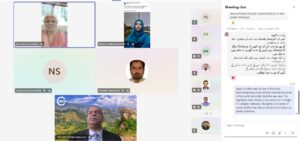 Karachi, July 2025: Is Pakistan’s plastic crisis a failure of behaviour, broken systems, or weak enforcement? As single-use plastics choke rivers, flood urban drains, and threaten coastal livelihoods, the question is no longer if we have a problem, but how deep it runs. On the occasion of International Plastic Bag Free Day, IUCN Pakistan hosted a webinar featuring senior journalists and environmental experts from Karachi and Thatta who unpacked the country’s growing plastic burden.
Karachi, July 2025: Is Pakistan’s plastic crisis a failure of behaviour, broken systems, or weak enforcement? As single-use plastics choke rivers, flood urban drains, and threaten coastal livelihoods, the question is no longer if we have a problem, but how deep it runs. On the occasion of International Plastic Bag Free Day, IUCN Pakistan hosted a webinar featuring senior journalists and environmental experts from Karachi and Thatta who unpacked the country’s growing plastic burden.
Mr. Mahmood Akhtar Cheema, Country Representative, IUCN Pakistan, remarked, “By 2040, plastic pollution is expected to rise by 50%, with around 11 million metric tons entering our oceans annually, choking marine life, contaminating food chains, and impacting livelihoods. In Pakistan, single-use plastics are deeply rooted in daily life, affecting rivers, cities, farmlands, mountains, and coastlines.” IUCN Pakistan, he continued, greatly values the role of journalists in supporting environmental awareness. This webinar reinforces that change comes through collaboration among stakeholders. We must work at the grassroots level engaging media, educational institutions, and religious institutes to promote behavioural change and sustainable practices.
Building on this, Ms. Afia Salam, Environmental Expert, highlighted that Pakistan remains highly vulnerable to climate change and its catastrophic impacts. She emphasized that journalists act as a bridge between society and the environment, playing a key role in changing mindsets. Pointing to the use of plastic bags, she urged, “If we cannot reduce, we must refuse.” She also raised serious concerns about micro and nano plastics, which increasingly threaten ecosystems and public health, entering our food chain. Additionally, she stressed the importance of replacing unregulated garbage dumps with properly engineered landfills to ensure effective, long-term waste management solutions.
Ms. Sheema Siddiqui, Climate Journalist and Trainer, emphasized the urgent need for behavioral change in both coastal and urban areas, where single-use plastic is widely used. She advocated for managing plastic consumption by adopting alternatives and reviving traditional, sustainable practices such as using cloth bags, reusing materials, and promoting recycling. She highlighted how Karachi’s shrimp industry, a key source of employment for coastal community, has suffered due to quality control concerns linked to plastic pollution. Additionally, she drew attention to the clogging of natural drainage systems such as the Lyari River, which has been severely degraded over the past two decades, disrupting the natural flow of rainwater and increasing urban flood risks.
Mr. Nazakat Shah, Senior Reporter from Thatta, shared a rural coastal perspective on the growing impact of plastic pollution on fishing communities. Citing a 2022–2023 survey, he noted that Thatta produces 374 metric tonnes of fish annually, with over 20,000 fishermen and 6,278 boats dependent on fishing for their livelihoods. He reported that plastic pollution has led to a visible decline in fish catch, affecting income stability in the region. Mr. Shah also highlighted that some fishermen unknowingly contribute to the problem by discarding guthka (chewing tobacco) wrappers and plastic packaging into the sea during fishing trips. He stressed that while the media plays a vital role in raising awareness, responsibility for enforcement and regulation lies with authorities.
Adding to the discussion, Mr. Syed Ghulam Qadir Shah from Pakistan’s Climate Change Authority noted that IUCN Pakistan has brought attention to a critical and timely issue through this webinar. He described the agenda as a necessary moment of self-reflection, particularly on the excessive use of single-use plastics. He emphasized that intercity rain drainage systems are increasingly clogged with plastic waste, much of which eventually flows into the sea. He underscored the need for collective ownership of the problem and called for coordinated, cross-sector efforts to improve waste management.
Bringing together voices from media, policy, and frontline communities, the webinar reflected IUCN Pakistan’s commitment to tackling plastic pollution through informed dialogue and multi-level engagement advancing both awareness and action to build a more sustainable future.
